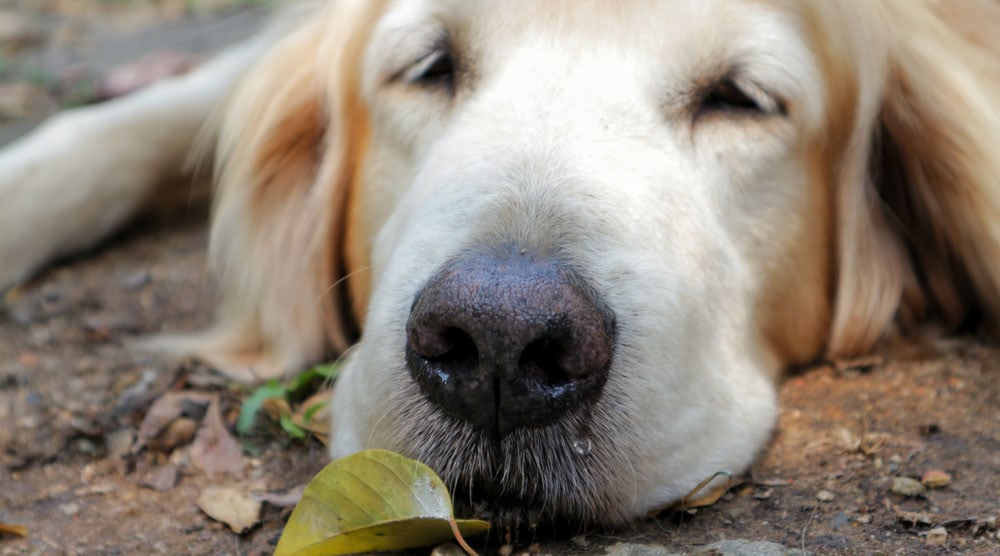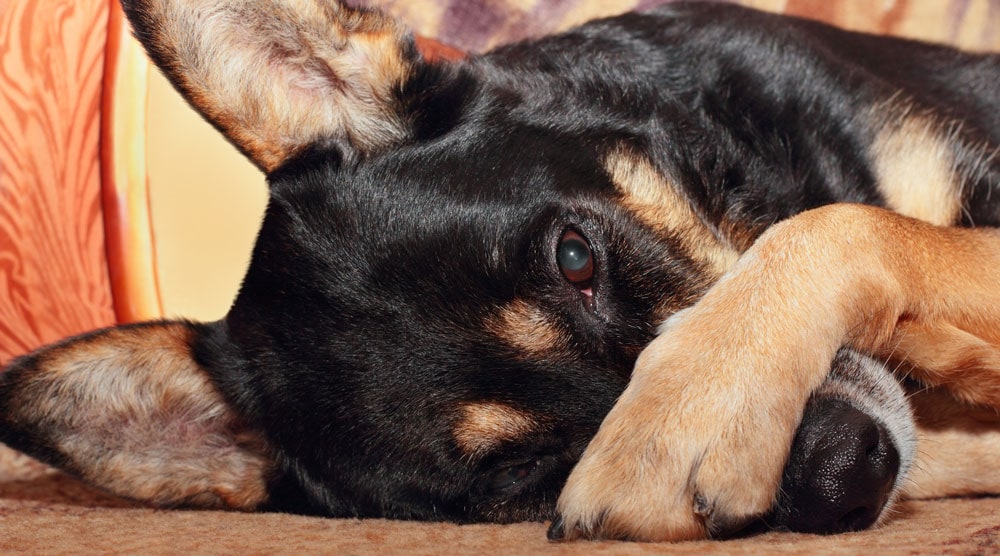Quick Answer
- Clear discharge from a dog’s nose without other symptoms is usually not a cause for concern. It is often caused by mild allergies or irritation.
- However, there are situations where clear discharge should be investigated by a vet. These include if the runny nose is continuous, excessive, or accompanied by other symptoms (such as sneezing or coughing.)
- Colored discharge is more likely to be a sign of illness. Yellow or green mucus can be caused by anything from bacterial infections to nasal polyps.
- Bloody discharge or nosebleeds may be caused by conditions such as tick diseases, blockages, injury, or cancer.
- Colored or bloody nasal discharge should always be investigated by a vet.
Runny noses in dogs are a common worry for pet owners. However, an occasional runny nose with clear nasal discharge is usually not a reason to be worried. This symptom often indicates a minor issue, such as anxiety, excitement, cold weather, or a mild allergy.
Colored nasal discharge is more concerning. Yellow, green, bloody, or cloudy discharge could indicate an infection, disease, or even cancer. A continuous runny nose also requires a vet checkup, as anything that hinders a dog’s sense of smell can affect their quality of life.
Let’s look at the potential causes of a runny nose in dogs and how they are treated. We’ll also discuss how to prevent a runny nose, how to manage a runny nose at home, and when to contact a vet.
Contents
- Quick Answer
- Color of Your Dog’s Nasal Discharge (And When To Be Concerned)
- 9 Causes of a Runny Nose in Dogs And How They Are Treated
- 1. Seasonal Allergies and Other Airborne Allergies
- 2. Sweat
- 3. Infections (Including Kennel Cough and Rocky Mountain Spotted Fever)
- 4. Item Stuck In The Nasal Passage (Blockage)
- 5. Airborne Irritants
- 6. Canine Periodontal Disease
- 7. Cleft Palate
- 8. Canine Distemper
- 9. Dog Nasal Polyps or Cancer (Nasal Tumors)
- When Should You Visit a Vet About Your Dog’s Runny Nose?
- Treating Nose Discharge in Dogs From Home
- Frequently Asked Questions
- Summary
Color of Your Dog’s Nasal Discharge (And When To Be Concerned)
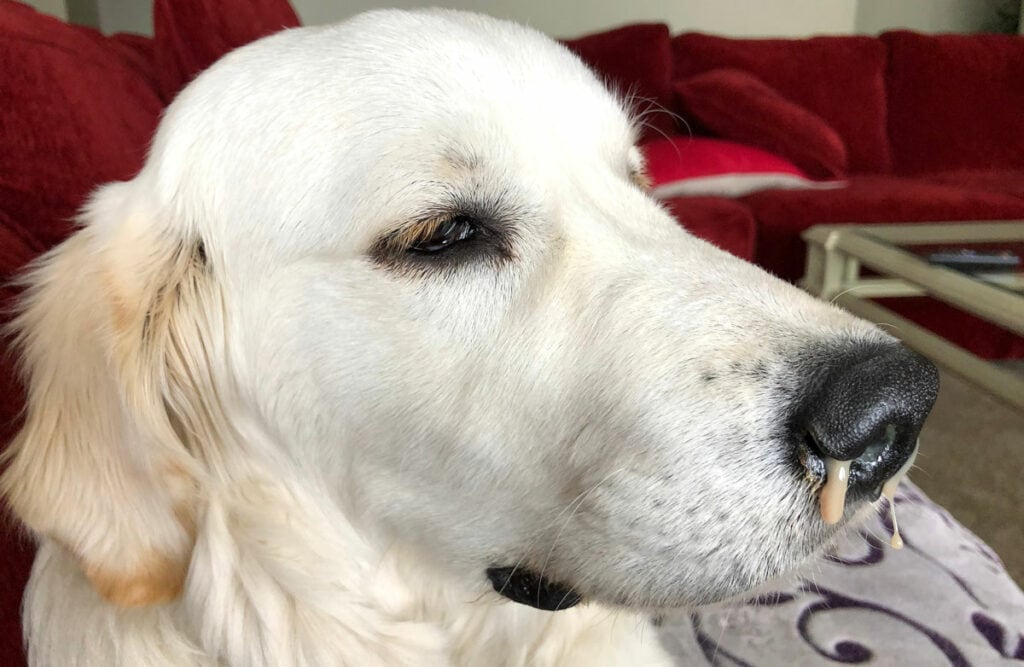
In most cases, clear discharge from your dog’s nose isn’t a sign of a severe health condition. The exception is if your dog is showing other symptoms of illness. These can include changes in behavior, appetite loss, sneezing, coughing, lethargy, panting, or a dry nose.
In contrast, colored nasal discharge is a cause for concern – even if your dog isn’t showing other symptoms.
“Runny noses are common, and most causes are benign, with the discharge being short-lived”, says vet Dr Simon. “However, a runny nose could indicate something more serious for some patients. Examples include a chronic fungal infection, nasal tumor, or advanced dental disease.”
“Typically, when a runny nose lasts more than a few weeks, or is associated with other signs like lethargy, nosebleeds, trouble eating, or weight loss, then we would want you to bring your dog into the clinic,” adds Dr Simon.
Here’s an overview of the different colors of discharge and what they might mean (some conditions can cause varying types of discharge.) We’ll discuss each of the causes in more detail in the next section.
| Color | Potential Causes |
|---|---|
| Clear | Allergies (most common) Airborne irritants Sweat Blockage due to foreign objects |
| Bloody | Blockage due to foreign objects Respiratory, sinus, or nasal infections Polyps Cancer (tumor) Tick diseases (such as Rocky Mountain spotted fever) |
| Yellow or Green (Mucus) | Bacterial infection Fungal infection Viral infection (such as canine distemper) Polyps Cancer (tumor) |
9 Causes of a Runny Nose in Dogs And How They Are Treated
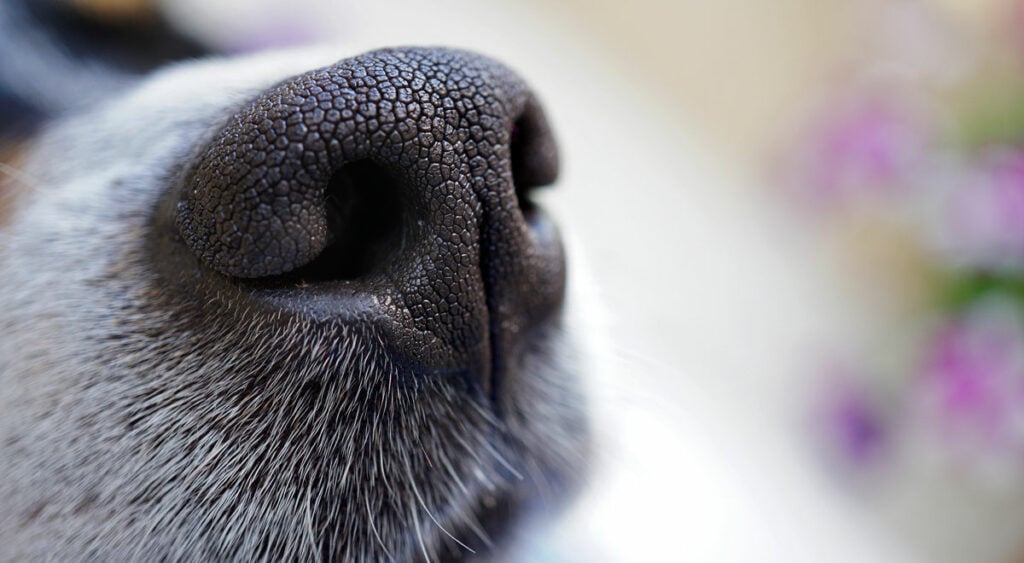
A runny nose in a dog is often caused by the nasal passages becoming irritated or dry. This triggers the dog’s nasal glands to produce more mucus to protect the nasal lining.
There are many underlying reasons for an irritated nasal passage, ranging from mild to severe. The proper treatment for your dog depends on what’s causing the issue. So, you should always contact a vet if you notice symptoms of illness, a continuously runny nose, or a colored discharge.
1. Seasonal Allergies and Other Airborne Allergies
Allergies are the most common cause of clear nasal discharge in dogs. According to a 2018 study by Banfield Pet Hospital, around 3.6% of dogs have an environmental allergy, but this seems to be increasing.
Allergens trigger inflammation in the nasal passage, which causes the discharge to be produced.
Many allergens can cause nasal discharge in your dog. This can make it hard to identify the one triggering your dog’s symptoms, although there are a few ways to narrow it down.
In most cases, a runny nose is caused by airborne allergens, which enter the nose directly. Some of the most common examples include dander, dust mites, pollen, mold, and even human skin cells. Allergies to food and medication can also cause a runny nose, although they are less common.
You can narrow down potential allergens further by noticing when your dog’s allergies are worst. “Keep a reaction diary and check if pollen levels are high when your pet is reacting,” says Dr Simon.
If the reactions are seasonal, then pollen might be the trigger. But if your dog suffers symptoms year-round, mold or dust mites are likely culprits.
Allergies rarely cause just a runny nose. There are almost always other symptoms, such as:
- Coughing
- Wheezing or difficulty breathing
- Sneezing
- Nosebleed
- Watery eyes (eye discharge)
- Sore ears
- Itching
- Paw licking
Vet Dr Simon adds, “Airborne allergies are a common cause of a runny nose, especially in dogs with atopic dermatitis (similar to eczema). So, often the dogs I see for itchy skin are also the ones I see for runny noses and eyes.”
The best way to treat allergies is to minimize your dog’s exposure to the allergen. This can be difficult, especially if you don’t know what’s triggering the symptoms in your dog.
For this reason, you must visit a vet if you notice signs of an allergy. They might recommend treatments such as antihistamines and steroids to help with the symptoms.
Another option is to perform an allergy test along with immunotherapy. This can be costly, and the test results can be inaccurate, so it’s something to discuss with your vet in-depth before pursuing.
2. Sweat
In some cases, what appears to be a dog with a runny nose may not be a nasal discharge at all!
Dogs can’t sweat through their skin, but they can sweat through their paw pads and nose. On hot days, their nose might seem wet or drip as they try to cool down. This is easy to mistake for a running nose.
This type of runny nose should go away as your dog cools down. If it doesn’t, then you should discuss it with your vet.
3. Infections (Including Kennel Cough and Rocky Mountain Spotted Fever)
Infections are another common cause of a runny nose in dogs. But unlike allergies, the discharge due to infection is usually thick or colored.
Respiratory infections also cause symptoms in addition to a runny or stuffy nose. These can include:
- Coughing
- Odorous discharge
- Mucus build-up
Bacterial infections, viral infections, and fungal infections can all cause a runny nose in a dog. Even certain canine parasites, such as nasal mites, can lead to nasal discharge.
A typical example is kennel cough, a highly contagious infection that can cause mucus or yellow discharge. BlueCross says this respiratory infection can be caused by bacteria and viruses, leading to coughing and nasal discharge. Kennel cough usually improves after a few weeks, although puppies, elderly dogs, or sick dogs are at risk of pneumonia.
Rocky Mountain spotted fever is another example of a bacterial infection that can cause nasal discharge. Ticks carry this disease, and it generally causes nosebleeds rather than mucus. It should be treated with antibiotics.
As many types of infection can cause nasal discharge, you must visit a vet if you notice any of the above symptoms in your dog. Properly treating your dog depends on the type of infection, so an accurate diagnosis is essential.
If your dog has a bacterial infection, the vet will typically prescribe antibiotics, which may need to be taken for several weeks. Fungal infections need a different type of medication called antifungals.
Vet Note from Dr Linda Simon: “Probably the most common infection I encounter that causes a runny nose is kennel cough. Infected dogs tend to be well in themselves and signs usually only last 1-2 weeks.”
4. Item Stuck In The Nasal Passage (Blockage)
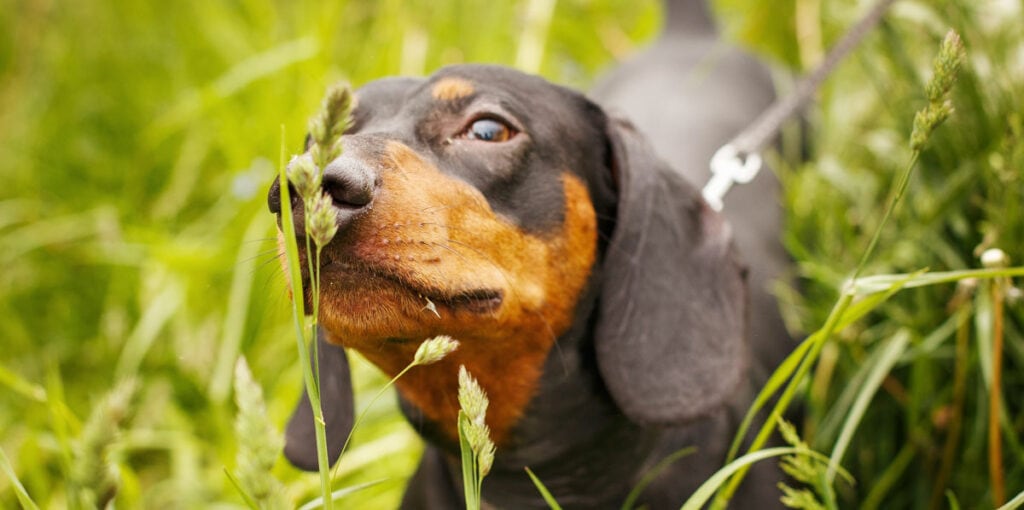
A dog’s nose spends a lot of time sniffing close to the floor. This can sometimes cause small objects to get stuck inside the nose, resulting in a blockage.
Any foreign bodies lodged inside the nose can cause irritation and nasal discharge. The symptoms often affect just one nostril, unlike infections or allergies.
Some examples of objects that can get stuck inside a dog’s nose include grass seeds, blades of grass, small insects, flower petals, or gravel.
A dog with a foreign object stuck in their nose will often shake their head or paw at the nose. They may also sneeze a lot or suffer from nosebleeds.
“When the discharge is only coming from one nostril, this tends to indicate a more localized issue such as a polyp or foreign body within that nostril,” says vet Dr Simon. “This sort of nasal discharge should always be looked into promptly.”
If you can see something stuck in your dog’s nose, you might be able to remove it carefully with tweezers. But it’s usually safer to take your dog to a vet, as the lining of the nose is very sensitive and prone to bleeding.
5. Airborne Irritants
Irritants in the air can cause the nose lining to become inflamed. The nose glands will then produce mucus to remove the irritant.
Some of the most common examples of airborne irritants include:
- Excessive dust
- Cigarette smoke
- Cleaning products
- Candles or incense
Unlike allergies, no dog medication can reduce the symptoms of an airborne irritant. Instead, you’ll need to improve your home’s air quality and limit exposure to the irritant.
Note: Cold weather may also trigger runny noses in dogs. The air causes the nasal lining to dry out, which increases mucus production.
6. Canine Periodontal Disease
Periodontal disease is caused by plaque and tartar build-up on the dog’s gums and teeth, resulting in inflammation. It can lead to various symptoms, including an ongoing runny nose.
In many cases, the nasal discharge caused by periodontal disease will only come from one nostril. The discharge will also typically be thicker than with allergies.
Other symptoms of periodontal disease include a loss of appetite, the dog pawing at their mouth, and pain when eating. Many dogs with periodontal disease also have bad breath, which is sometimes mistaken for “dog breath.”
“Snub-nosed breeds with a shorter snout (such as the Pug and Shih Tzu) are more prone to dental disease,” says Dr Linda Simon. “So I often see a runny nose as a secondary symptom to oral inflammation in these dogs. These breeds are also prone to stenotic nares (pinched nostrils) and chronic respiratory infections, leading to runny noses.”
Periodontal disease is a serious condition that needs veterinary care. Early-stage periodontal disease can sometimes be treated with a dental cleaning. However, later stages may require surgery to remove the tartar or extract the teeth.
For this reason, you should always contact a vet immediately if you notice these symptoms in your dog.
7. Cleft Palate
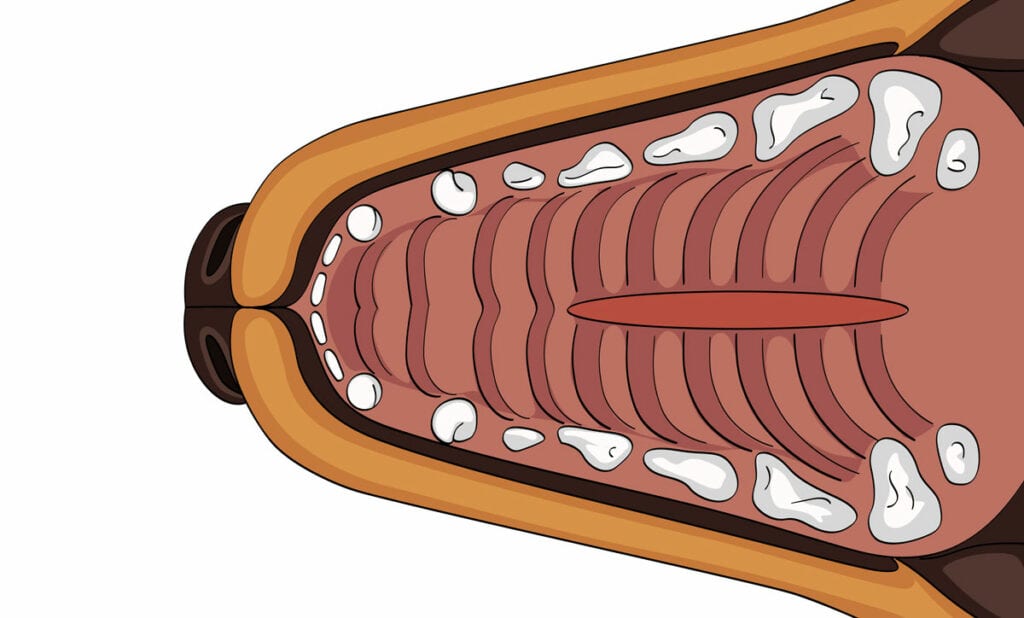
A cleft palate, when a dog’s palate isn’t properly fused, can cause nasal discharge after eating. This can happen from birth (congenital) or later in life due to disease or trauma.
According to PetMd, the discharge happens because the gap in the palate allows food to travel into the nasal cavity instead of the oral cavity. It can also cause the dog to sneeze and regurgitate their food.
Surgery will often be required to fix a cleft palate and stop the nasal discharge.
8. Canine Distemper
Distemper is a virus that attacks many organs of a dog’s body, ranging from the gut to the brain.
This means it can cause many symptoms in a dog, such as a loss of appetite, diarrhea, and fits. It can also cause a continuously runny nose, which becomes more sticky and pus-like over time.
Unfortunately, distemper is a contagious airborne virus that can be picked up through contact with other dogs (or items they have touched). So, the best way to prevent distemper is through vaccination. Puppies should have three vaccinations aged 8-16 weeks and regular vaccinations as adults.
You should contact a vet immediately if your dog shows symptoms of distemper. According to the Cornell Wildlife Health Lab, it’s a severe condition that’s fatal in 50% of adult dogs and 80% of puppies. The dog will require urgent medical care to give them the best chance of overcoming the virus.
Treatment for canine distemper varies depending on the dog’s symptoms. Your vet may use a combination of antibiotics, painkillers, anticonvulsants, and other medications.
Vet Note From Dr Linda Simon: ‘Thankfully, thanks to most owners vaccinating their pets, in 11 years of clinical practice I am yet to see a case of distemper. In the developed world, it has become a rare disease’.
9. Dog Nasal Polyps or Cancer (Nasal Tumors)
Nasal polyps are growths inside the nasal cavity. They can cause irritation and a continuous runny nose (also known as a nasal drip).
Polyps may also restrict the airflow through your dog’s nose and make breathing difficult. Surgery is usually required to remove them, although they may grow back in the future.
While nasal polyps usually aren’t harmful to a dog, similar symptoms can also be caused by tumors in the nose. Benign and cancerous tumors can lead to a nasal drip, so getting a vet checkup is essential. Other symptoms might include a lump on the side of the nose, loud breathing, and a loss of appetite.
Benign tumors in the nostrils can be removable with surgery. However, cancer in the nose is hard to treat, and surgery isn’t often successful, so your vet may recommend radiation therapy.
When Should You Visit a Vet About Your Dog’s Runny Nose?
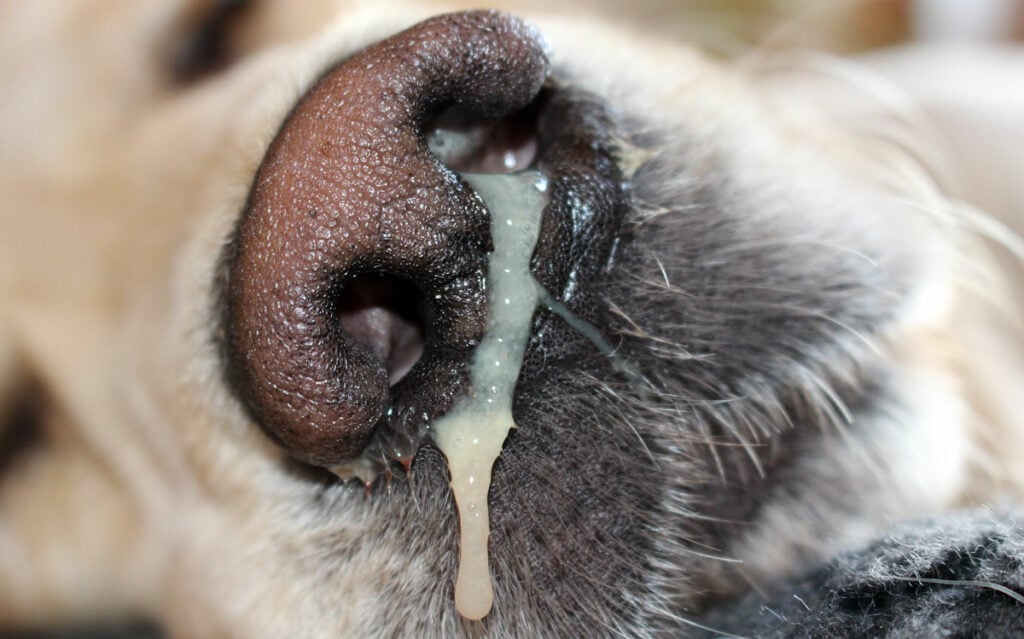
If you notice your dog has a clear and watery nasal discharge, this usually isn’t anything to worry about.
However, this only applies if your dog’s runny nose is occasional and your dog shows no other symptoms (such as loss of appetite or coughing). An ongoing snotty nose, or a discharge that isn’t clear and watery, could indicate a medical issue.
For this reason, you should take your dog to a vet if you have concerns about a runny nose. When in doubt, always play it safe with your dog’s health!
A vet checkup is crucial if:
- The dog’s runny nose is combined with other symptoms (including behavior changes)
- The discharge continues for more than a short period or becomes chronic
- The discharge happens regularly
- The discharge is cloudy, green, yellow, or any color other than clear
- The discharge is thick rather than thin and watery
- There is a large amount of discharge
- The discharge has a noticeable odor
- The dog’s nose is dry or cracked (although keep in mind that a wet nose doesn’t necessarily mean the dog is healthy)
- You have doubts about your dog’s health or wellbeing
Remember, dogs rely on their sense of smell much more than humans. They have 220 million nose receptors, compared with our 5 million! So, you’ll want to get a vet checkup for any symptom that might affect your dog’s sense of smell.
How Your Vet Will Diagnose Dog Nose Discharge
Your vet will take a medical history and perform a physical examination of your dog to determine the underlying cause of their sniffly nose.
This will involve a nasal exam to check for foreign bodies or obstructions, an assessment of the type of discharge, and a general examination. Your vet may also perform an oral exam to identify any dental issues.
“When I encounter a dog with a persistently runny nose, I’ll ask the owner about their history. I pay close attention to things like the dog’s age, breed, and any underlying medical issues they have,” says Dr Simon.
“I’ll also perform a complete physical exam. This includes looking into the dog’s nose and mouth, listening to their heart and lungs, assessing hydration levels, and checking for a fever. “
In some cases, more specialized diagnostic tools may be needed. These can include:
- A rhinoscopy may be required to look deeper into the nasal cavity. This procedure is usually performed under a general anesthetic.
- Blood tests may be performed to check for diseases that can lead to dog nose discharge, including those transferred by ticks. A nasal swab can also be used to check for infections.
- Your veterinarian may recommend X-rays or CT scans to check for abnormalities in the nasal cavity.
Treating Nose Discharge in Dogs From Home
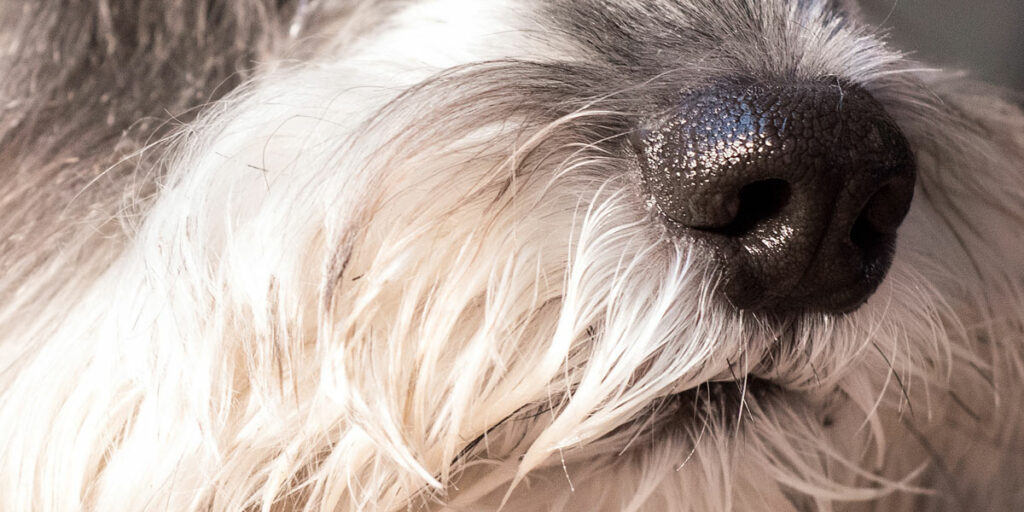
Your vet can advise you on the best treatment for your dog’s runny nose. When you get home, you can take a few steps to make your dog more comfortable.
- Minimize exposure to dust or other irritants if your dog has a runny nose. Cigarette smoke, cooking fumes, or incense can irritate a dog’s nasal passage. It’s also a good idea to put your dog in a different room when cleaning, as many cleaning products can irritate a dog’s airways. Dust stirred up when vacuuming can have a similar effect.
- Gently wipe away any discharge. Use a warm, wet cotton wool pad to avoid irritating the nose further.
- Avoid vigorous exercise while your dog is recovering from an illness. Just like with humans, it’s vital that your dog’s body has a chance to recover after an infection or other illness. Ask your vet about when and how much to exercise your pet.
- Air humidifiers can help with congestion. Dry air can cause a runny nose in dogs, so a humidifier can help. Just make sure you’re not increasing the humidity beyond healthy levels!
- Regularly examine your dog’s nose. Keep a close watch for dryness, changes to the discharge, or any blood. Flared nostrils can also indicate that your dog is having difficulty breathing normally.
- Watch for any other signs of illness. Sneezing, coughing, pawing at the face, excessive scratching, and vocalizations can all signal an illness in your dog. Changes in behavior or appetite are also warning signs that something isn’t right.
Always check with your vet before using home remedies for a dog’s runny nose. While some home remedies may be helpful, not all may be safe or suitable for your dog.
Frequently Asked Questions
Any dog can suffer from a runny nose, but brachycephalic breeds (such as Pugs or Bulldogs) are more prone to it. These breeds have weak cartilage inside the nose and often have difficulty breathing, making a runny nose more likely. Dogs with long snouts, such as sighthounds and German Shepherds, are also more prone to fungal nose infections.
Treatment for a runny nose in dogs depends on the underlying cause. For allergies, a vet may recommend antihistamines or an allergy test. For bacterial infections, a course of antibiotics may be required.
You should never give your dog medication or treatment without discussing it with your vet. The wrong treatment could cause additional health problems.
Summary
There are many potential causes of a runny nose in dogs. These range from mild issues, such as allergies, to life-threatening conditions, such as distemper.
A clear, watery, odorless nasal discharge is often not a worrying sign – as long as it only happens occasionally to your dog. But you should contact a vet if you notice other symptoms, if the runny nose happens a lot, if the discharge is colored, or if it has an odor.
Do you have any questions about what causes a dog’s runny nose? Please let us know in the comments below. If you want to learn more about your dog’s nose, read our guide to why dogs cover their noses when sleeping.
References:
- Niemiec, B.A. (2013). Veterinary periodontology. Ames, Iowa: John Wiley & Sons.
- Alabama Cooperative Extension System (2011). The Dog’s Sense of Smell.
